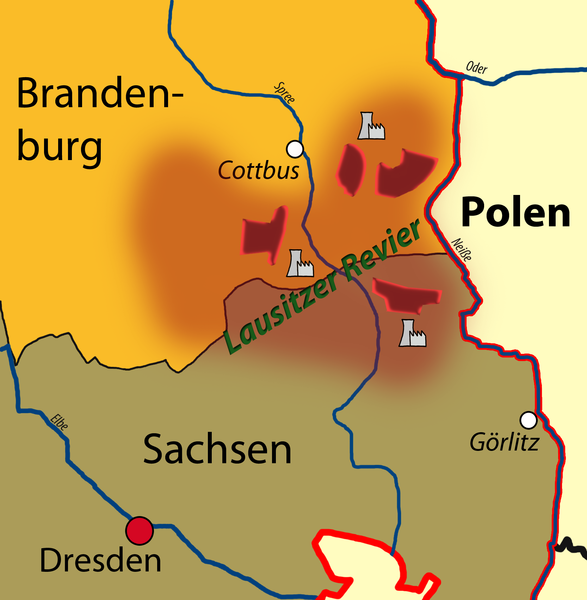News Release from windfair.net
Wind Industry Profile of
Greenpeace: No cash for coal
About a year ago Sweden elected a new government which is now run by Social Democrats and the Greens. Shortly after, the Scandinavians announced that energy company Vattenfall, which is 100% state owned, should quickly phase out of business with fossil fuels. This affects in turn mainly Germany, because large production sites and power plants of the company are located in the Lusatia area in Brandenburg and Saxony in Eastern Germany.
In recent years, the names of 'Schwarze Pumpe', 'Jänschwalde', 'Boxberg' and 'Lippendorf' became famous – whenever a new list of the least carbon efficient power stations in Europe was published. All of these power plants are owned by Vattenfall, all located in Lusatia. Not a very good advert for Germany, which likes to consider itself as the leader of the climate saving nations of the world.
Now it seems, however, that tides can change into a completely different direction: After Vattenfall had officially announced its intention to take leave from the German lignite business and established their division for sale, the environmental organization Greenpeace announced its interest in taking over the business.
First step was to file an official 'Letter of Interest' to the London Citi Group, transacting the sale for Vattenfall. Thus, the Northern European branch of the organization, Greenpeace Nordic, was listed as an official party and was granted access to certain documents. This Tuesday, the next step followed: A 'Statement of Interest' was issued, in which Greenpeace stated in detail what to do with the division of the Swedish company, because Greenpeace, of course, doesn't want to make cash with coal - besides it's being impossible nowadays anyway, stated the organization.
Instead Greenpeace wants to set up a foundation into which the lignite business will be transferred subsequently. "By 2030, the foundation will have shut down the power plants and opencast mines in Lusatia and accelerate the conversion of the lignite division into a renewable energy company," said the organization. The exit would be proceeded "socially acceptable and without jeopardizing climate protection".

Lignite mining areas in Lusatia (Source: Wikimedia)
Coal miners in Lusatia may receive this announcement with mixed feelings. "It is therefore clear to us that they (the governments of Sweden and Germany, A/N) ought to take responsibility to prepare the region for structural change and job development in other economic sectors", states Annika Jacobson, Program Manager of Greenpeace Nordic.
The Lusatia region could thus face similar changes like the Ruhr area at the beginning of the 1980s, when coal mining was phased out. Skyrocketing unemployment and lack of prospects determined the region for many years afterwards. Today this has changed fundamentally – especially through renewable energy: North Rhine-Westphalia is now the federal state of Germany where most wind industry suppliers have their headquarters.
This can happen in Brandenburg and Saxony, too, where the Lusatia area is located. Brandenburg is already the state with the most installed wind turbines at the moment. Furthermore, it is ranked #5 in the 2014 Renewable Energy Agency study assessing all German federal states by their use of renewable energy. "The potentials for renewable energies in Brandenburg and Saxony are substantial, and Lusatia is Germany's sunniest region", Jacobson pointed out at the presentation of the program. The region is thus predestined for large installations of photovoltaics in the future which will bring new jobs.
There are two competitors for Greenpeace so far in the bidding process: Czech energy companies CEZ and EPH who both want to further exploit the lignite.
Crux of the project for Greenpeace will be the purchase price. The organzation calculates the market value of coal to be less than half a billion Euro by 2030. At the same time an investment of more than two billion Euro must be faced to include the decommissioning of the old power plants and the restoration of open-cast mines - not to mention costs caused by climate change and the consequences for peoples' health.
Since Greenpeace cannot use any donations for the purchase, the organization needs to search for investors. Where the money will come from remains in the dark so far. Also, the purchase price hasn't been named officially yet.
It looks like the main reason for Greenpeace's effort to buy the old coal mines is to put pressure on the German and Swedish governments – on the eve of negotiations of the Paris summit on climate change. Sweden has been a front-runner to fight climate change for a long time: The country is ranked #5 behind Denmark in the Climate Protection Index 2015, while Germany only made it to #22. The Swedes nowadays already produce more electricity from renewables than they consume. 6000 megawatts of wind power are already installed, especially in most cost-effective onshore wind. Offshore wind potential hasn't even been explored yet, but is estimated to over 17,000 MW for the entire Baltic Sea region. In addition, Sweden announced recently to phase out of energy production by fossil fuels as soon as possible.

"Sweden and Germany are both countries known for wanting to take leadership on climate" said Jacobson. "If Vattenfall and the Swedish and German governments are not ready to take their responsibility, Greenpeace Nordic feels it is our obligation to step in and become part of the process. I have been asked several times by journalists: 'Is Greenpeace Nordic serious in this?' I believe we are the ONLY serious part in this process so far.”
Strong words by the environmental organization. There is considerable doubt though if Greenpeace will actually take over responsibility for the lignite activities in East Germany. The announcement, however, has made sure that the sale of the lignite division is brought into public debate. At least that part of their intention was therefore met.
- Author:
- Katrin Radtke
- Email:
- kr@windmesse.de
